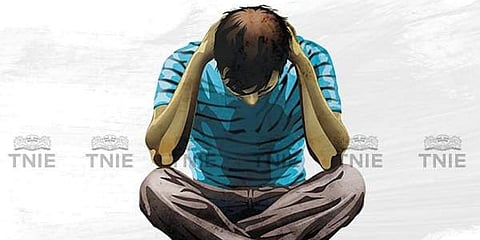

BHUBANESWAR: The alleged suicide of Gangapur police station inspector-in-charge Dev Kumar Gamang has once again raised the alarming question - Is Odisha government concerned about the mental and physical well-being of its police force?
Forty-year-old Gamang reportedly shot himself with his service gun in his official residence on Friday in the presence of three officers. Ganjam Police claimed he was suffering from mental health issue over the last few years.
Police personnel work under tremendous pressure. The nature of work aside, the poor working conditions, long hours of duty, lack of leave and regulated off-days, leave them vulnerable to stress. Only it is not addressed in a structured manner.
Apart from putting in 12 to 14 hours a day, they do not have the luxury to spend time with their families and this leads to conflicts. The police personnel also give a miss to festivals to ensure they are on duty.
A major reason is the staff shortage in the workforce and vacancies. Odisha Police’s current strength is about 70,000 but there are at least 10,000 vacancies in different wings of the force.
A Bureau of Police Research and Development’s (BPR&D) 2019 data on police-population ratio says Odisha has 67 cops to man one lakh population. In Andhra Pradesh, it is 85, Gujarat (87), Uttarakhand (95) and West Bengal (97) and they are part of the bottom 10 States.
At the inspector levels, the State suffers from vacancies. Odisha’s sanctioned strength for inspectors/reserve inspectors is 1,150 where there are 100 vacancies. As per BPR&D, the sanctioned strength of sub-inspectors/reserve sub-inspectors is 3,498 and for assistant sub-inspector/reserve ASIs is 4,673 but there are 1,080 and 1,488 vacancies respectively.
The IICs, SIs and ASIs who take up investigation of important cases besides carrying out law and order duties face an increased workload that triggers mental stress among them. A senior officer pointed out that forces like Central Reserve Police Force (CRPF) and Border Security Force (BSF) have come up with organised responses to regularly check their personnel’s mental and physical health.
“In Odisha, we have to cover some distance in this regard. We have police hospitals where the doctors attend to the cops and their family members. However, they mostly provide curative treatment. In terms of providing preventive treatment including counselling to the personnel, more needs to be done in the State,” he added.
Former DGP GC Nanda agrees. If police’s work overload is not managed immediately, their mental and physical well-being will deteriorate further in the coming days, he says.“About a decade back, resources were not adequate but still manageable. However, infrastructure and resources are highly inadequate in current times adversely affecting the State police force,” he said.
Addressing issues of mental well-being apart, there is a lack of up-gradation of skill and training. According to the Status of Policing in India report 2019 by Common Cause and Centre for the Study of Developing Societies (CSDS), only 14.3 per cent SIs/ASIs of the State received in-service training as against the national average of 17 per cent.
Odisha, West Bengal, Bihar, Uttar Pradesh, Uttarakhand, Kerala, Maharashtra and Gujarat are the states that neither has been able to provide in-service training to a large proportion of personnel nor have they incurred significant expenditure on training.
According to Anuradha Mahapatra, founder of Manam Foundation, a non-profit facilitating mental wellness, an outbreak of coronavirus pandemic put a severe toll on the well-being of the police personnel across the country.
“Police personnel’s work has always been very challenging, and the demanding working hours during the pandemic to enforce lockdown/shutdown and assist authorities to manage the containment zones added to their stress. This led to work overload and the police personnel were hardly able to spend time with their families,” she said.
Government should form batches of police stations in every region and set-up one counselling station for each group. “The counselling stations should be outsourced and not linked with police department. This will ensure police personnel are able to share their problems comfortably and confidentiality is maintained. Besides, senior officers should also organise sessions on mental awareness for their sub-ordinates every three or six months,” she added.
DGP Sunil Kumar Bansal said Odisha Police has facilities to check and look after the health issues of the cops.“We are a large force but incidents like Gangapur IIC can never be ignored. It was a very unfortunate incident, and efforts have always been made to reach out to officers/personnel who show any sign of depression or anxiety. We are mulling to set up camps to check health parameters (physical and psychological) of the police personnel,” he added.
Force under stress
Odisha Police’s current strength is about 70,000 but there are at least 10,000 vacancies in different wings of the force
2019 data on police-population ratio says Odisha has 67 cops to man one lakh population
Odisha’s strength of inspectors/reserve inspectors is 1,150, and there are 100 vacancies